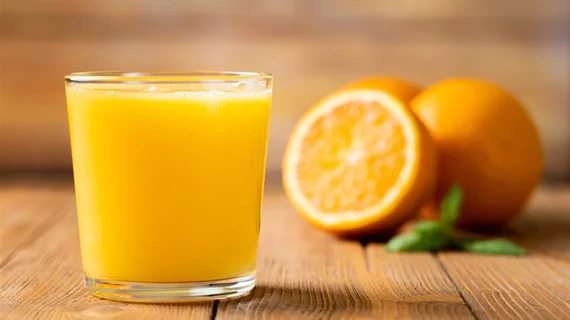A glass of orange juice a day may help keep the cardiologist away
According to the old saying, an apple a day keeps the doctor away. But can drinking orange juice have a similar effect on cardiologists?
A team of researchers out of Brazil explored the latest evidence of the therapeutic potential of orange juice, publishing its findings in Metabolites.[1]
“Cardiovascular disease (CVD) can be prevented by addressing behavioral risk factors such as diet,” wrote first author by Priscila Portugal dos Santos, a researcher with Sao Paulo State University in Brazil, and colleagues. “The process of cardiac remodeling lies at the core of most CVDs. Cardiac adaptation to pressure or volume overload, which typically occurs in several CVDs, is associated with cellular and molecular alterations in cardiomyocytes and the interstitial matrix, which leads to anatomic and functional remodeling of the heart. The alterations include myocyte hypertrophy, interstitial fibrosis, increased oxidative stress inflammation and apoptosis, and changed energy metabolism. Although initially adaptive, the sustained cardiac hypertrophic remodeling results in progressive myocyte dysfunction, heart failure and ultimately death.”
One way to fight back against the risk of cardiac remodeling, the authors noted, is introducing affordable foods to your diet with “potential cardioprotective properties.” Orange juice, it seems, represents a perfect example of such a food.
To learn more about the potential health benefits of drinking orange juice, the group tracked years of research on the topic, highlighting several ways orange juice appears to be good for a person’s cardiovascular health.
One metabolomics-based study, for example, found that just two weeks of drinking orange juice can decrease medium- and long-chain acyl-carnitines and increase short-chain acyl-carnitines in blood levels, which influence liver fatty acid β-oxidation. A separate analysis found that overweight and obese adults who drink orange juice may experience a decrease in oxidative stress, anti-inflammatory benefits and modulated gut microbiota metabolism.
Orange juice also seems to increase the presence of phosphatidylethanolamine (PE) and cyclic phosphatidic acid (CPA). While PE appears to pave the way for improvements in energy metabolism, mitochondrial function, oxidative stress and inflammatory activation, researchers explained, CPA “inhibits arterial wall remodeling and inflammatory mediators’ secretion, preventing atherosclerosis.”
The study listed other apparent benefits of drinking orange juice. For example, there is evidence that it can help signal endocannabinoids in a way that could potentially play a helpful role in the regulation of cardiac function. In addition, research suggests orange juice could impact a person’s gut microbiota in a way that could potentially help reduce the risk of certain diseases, including obesity and insulin resistance, from developing.
“The findings suggest that orange juice can act as a metabolic modulator, with potential therapeutic implications for CVDs,” the authors wrote. “Nonetheless, further studies are needed to evaluate the metabolome in CVDs to confirm modulation of metabolic pathways by orange juice.”
One potential limitation of this work is the fact that it was funded by the National Council for Scientific and Technological Development, a federal agency in Brazil. Brazil is known for its thriving orange and orange juice production. However, none of the authors reported a relationship with the council or any other potential conflicts of interest.
Click here for the full study.

